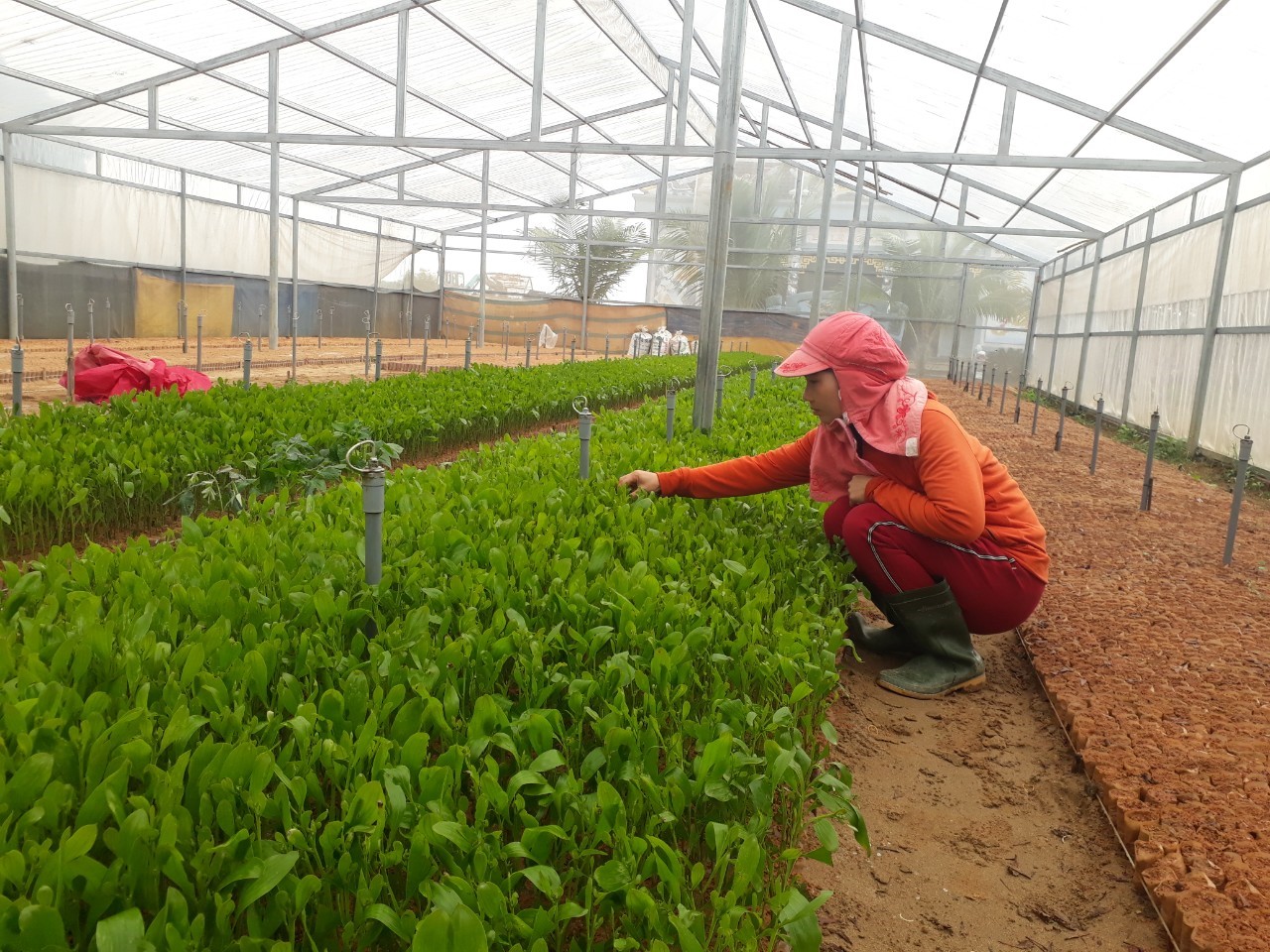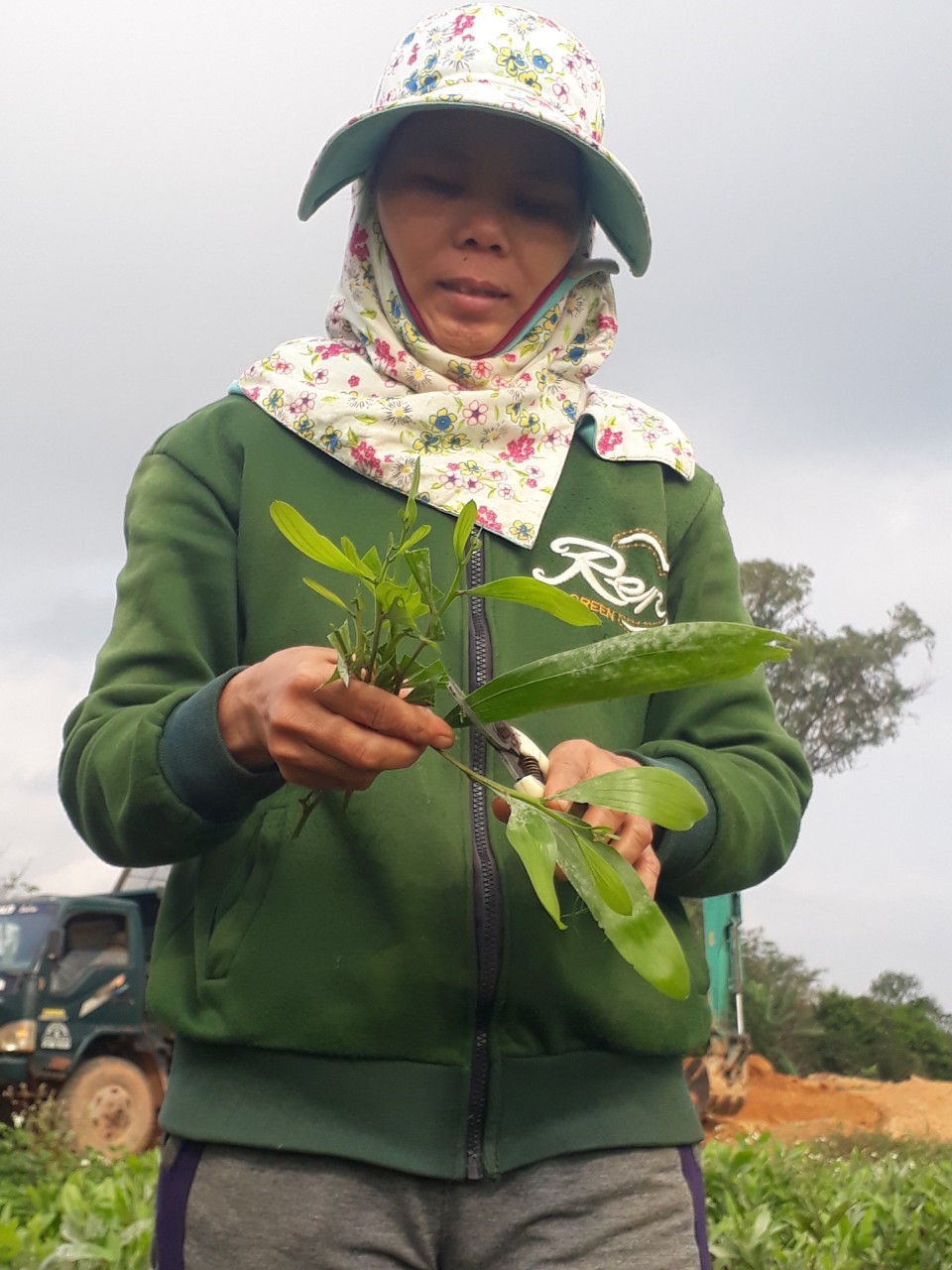Growing a future: Meet the hardworking women on the frontline of Vietnam’s budding sustainable forestry sector
In the rural communities of Quang Tri Province, Vietnam, opportunities to earn a stable living are hard to come by. This is especially true for women, who are often the primary caretaker of their families. In a tree nursery in the Cam Lo district, an innovative NEPCon project supports local women in growing more sustainable and inclusive livelihoods – one seedling at a time.
When Nguyen Thi Khang was a young girl, she lost half her eyesight and much of her health during the war. With it, the now sixty-year-old woman lost access to many of the job opportunities that exist in the rural Cam Lo District of Quang Tri Province, Vietnam. Nonetheless, she is the main breadwinner of her family of four. Her husband’s disability and old age prevent him from working, so it is up to Nguyen Thi Khang to provide for both the couple and their two children.
Her story is not exceptional in Quang Tri. Due to its geographic location, the province was hit the hardest during the war, and many in the poor communities of the province are still paying the price. Poor weather and soil conditions limit the crops that can be grown here. Women especially are struggling to find well-paid work; not only due to the low level of education, but also because few work opportunities accommodate the fact that women are shouldering most of the domestic responsibilities.
This is a challenge that Le Thi Tri knows only too well. The forty-year-old woman has two children in primary school and an elderly father, whose cerebrovascular accident has left him in need of regular care. To sustain her family, Le Thi Tri has worked on rice farms as well as in various additional jobs after the day’s work on the farm. But her work has come with major logistical challenges. “Often the jobs are fulltime and a long distance from my home,” she explains.
Planting for a sustainable forest sector
Both women turned their situation to the better when they found a job at a local 5,000 m2 tree nursery owned by Le Ngoc Hoan. With funding from the Nordic Climate Facility and the support of NEPCon, Spark and SEPON, the nursery has joined an innovative and comprehensive project in the province. The project aims to support Quang Tri’s forest sector in becoming more sustainable while creating better and more inclusive livelihoods for local communities.
Even though sustainable forest management under certification schemes comes with many economic and environmental benefits, certification is not widespread in the province. This is mostly because smallholder farmers in the area lack technical knowledge, relevant business connections and finance. To achieve the project’s goal, partners are working together to build the foundation for a local supply chain of certified wood in Cam Lo – from forest to factory.
This is where the women of the tree nursery come in.
The local farmers’ production of sustainable wood – and the income it generates - can only ever be as good as the seedlings the wood is grown from. Which is why one of the project's activities is to set up high-quality nurseries to provide enough affordable, high-quality seedlings for the farmers.
The first of these tree nurseries is the one that Khang and Tri work for. The lessons learned by them and the other workers will provide valuable insights for other nurseries being set up in the district.
To get the nursery up to speed, the project has invested in a whole range of improvements for the nursery. A new 220 m2 greenhouse has been built, which allows the nursery to produce trees all year round and bring down the mortality of seedlings in the rainy season to half the previous rate. The irrigation system has been improved with new wells and electric water pumps. 15,000 high-quality parent acacia plants have been provided, and workers receive technical support and training by project staff and local experts.
The seedling nursery has now expanded to twice its original size and doubled the number of seedlings it can produce each year. In 2019, the nursery provided farmers with about 1.5 million cuttings of superior quality. With seedlings of this quality, the income of these forest farmers is estimated to grow by a third over the next five years, because it allows them to increase the productivity of their plantations.

“The support we received through the project has motivated me to keep improving the nursery. We can now produce trees at a price that is 30 per cent lower than the market price for the same quality and will receive more orders from farmers with the support from the project. This allows me to keep upgrading and expanding the production in the future,” says nursery owner Le Ngoc Hoan.
A stable livelihood
As a result of the expansions and new growing practices, the nursery has created more jobs for the local community. It has almost doubled its work force, which now consists mostly of local women, some of which are living with disabilities. And while this has helped the nursery produce more responsibly grown seedlings for farmers, it has also made a big difference for the women.
“My house is only a dozen steps away from the nursery, so Le Ngoc Hoan offered me a job as a good neighbor,” says Nguyen Thi Khang. Because of her health, she works part-time and mostly does light jobs such as weeding and sorting seedlings. The nursery owners’ inclusive approach made a big difference for her in itself; but seeing the new improvements in the nursery gives her added hope, she says: “The nursery looks better, the seedlings are better, and fewer of them die. This makes my work a lot easier.”
Her wages go to support herself and her husband, but mostly to put her two kids through university. “What I earn now will not make me rich, but it brings the necessary stability to my family. I do not live from hand to mouth,” she says.

For Le Thi Tri, working in the nursery has meant a more stable workday, which also frees up more time to care for her family, as the nursery is not far from her home. Learning on the job, she is now taking care of all stages of the growing process, including soil screening, soil composting, planting and cutting. “My wages are better than before and I now have steady work throughout the year. I hope the nursery develops further so more workers like me can also benefit,” she says.
Working with the new acacia varieties has become an image of this hope for her: “The seedlings are so green and fat. They grow really well. I feel happy when I look at them.”
The project in Quang Tri will continue through 2020. Other key project activities include:
- A study on improved forest management
- Training 500 leaders of farmer associations in sustainable forest management techniques
- Training local wood processing companies in better practices and certified production
- Raising local authorities’ awareness of sustainable forest management and arranging visits to sustainable forest management initiatives in the province
You can read more about the project in Cam Lo here or explore our many other projects around the world here.